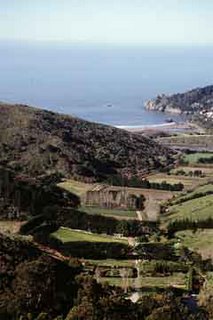
If I am anything, I believe I am more Buddhist than anything else. Yes, I have within me some wisdom and morality from Christianity. I admire much in Judaism. Islam, I have not really studied, but I sense within it there is much of value, especially among the Sufis. Hinduism astounds me with its rich heritage, its broadness, its depth, its all inclusiveness.
Out of the many facets of Buddhism that appeal to me is its compassion for all sentient (and even non-sentient) beings. There is a tenderness towards the "least" living things: a blade of grass, an insect; and on the non-sentient side: a river, mountain, prairie.
Buddhism is not vertical; it is horizontal. It sees everything in reality on a even level line. All are significant. All are related. All are inter-dependent.
The Old Testament (Jewish Bible) I believe has been misinterpreted to say that God has given all of creation for us poor humans to manage, maltreat, consume, destroy---to use as WE see fit for OUR benefit. I think this mistaken idea is found more among certain Christians, some of whom believe they understand the Jewish Bible better than the Jews themselves.
There is a place, though, in the Old Testament where it speaks of human beings as "stewards of creation". Well, this is a definite improvement in attitude. And, if really taken seriously, sincerely and thoughtfully--should mean dealing with the universe with wisdom and compassion. And NOT, to look upon it solely as a means for profit, or a means to make a life as pleasurable as possible for ourselves.
I just checked the dictionary: A steward is one who is hired to take care of the owner's property. From the monotheist's viewpoint the owner would be God, and we had better show an accounting for him, when He/She is ready. Not bad.
Another definition: a person whose responsibility is to take care of something. This is more general, but I like the word --care--the provision of what is necessary to the health, welfare, maintenance, and protection of someone or something.
So, in this sense a steward has NO self interest. His sole concern is for his/her "wards" in a way that benefits them, that nurtures them----NOT himself. There is an feeling of tenderness and compassion. And there is no thought of misusing his responsibility.
I can admire the proper role of a steward. However, in my heart, I prefer the Buddhist attitude of seeing ourselves as just one part of reality: intertwined and interdependent. There is no two or three---there is just one being. And that reality is Not-Two. Then one sinks into a
reality in which there is no dualism---just what is. Feelings of compassion arise within us towards everything---including ourselves. No separation.
I remember when I first discovered Buddhism in 1975, I was taken by its sense of "earthiness," of suchness, of things just as they are.
I really love the "Ceremony Askiing Forgiveness from the Plants and Animala," which comes from the Green Gulch Farm, a Zen Community, just north of San Francisco in Marin County because it catches in such a poignant manner the reality that no matter how hard we try to respect the existence of other beings---simply to live is to do some harm to others. The trick is to so as little harm as necessary, and to ask forgiveness from our fellow beings:humans, animals, insects, mountains and rivers. Strive to tread lightly. Take only what is absolutely necessary.
Here is part of the Ceremony Asking Forgiveness from the Plants and Animals which comes from the Green Gulch Farm (pictured above), a Zen Buddhist community north of the Golden Gate Bridge in Marin County. (If you would like to read the rest of this ceremony you can find it at my homesite.
Plants and Animals in the Garden,
We welcome you -- we invite you in -- we ask your forgiveness and your understanding. Listen as we invoke your names, as we also listen for you:
Little sparrows, quail, robins, and house finches who have died in our strawberry nets;
Young Cooper's hawk who flew into our sweet pea trellis and broke your neck;
Numerous orange-bellied newts who died in our shears, in our irrigation pipes, by our cars, and by our feet. . . .;
Gophers and moles, trapped and scorned by us, and also watched with love, admiration, and awe for your one-mindedness. . . .;
And all plants we have shunned: poison hemlock, pigweed, bindweed, stinging nettle, bull thistle;
We call up plants we have removed by dividing you and separating you, and by deciding you no longer grow well here.
We invoke you and thank you and continue to learn from you. We dedicate this ceremony to you. We will continue to practice with you and for you.

